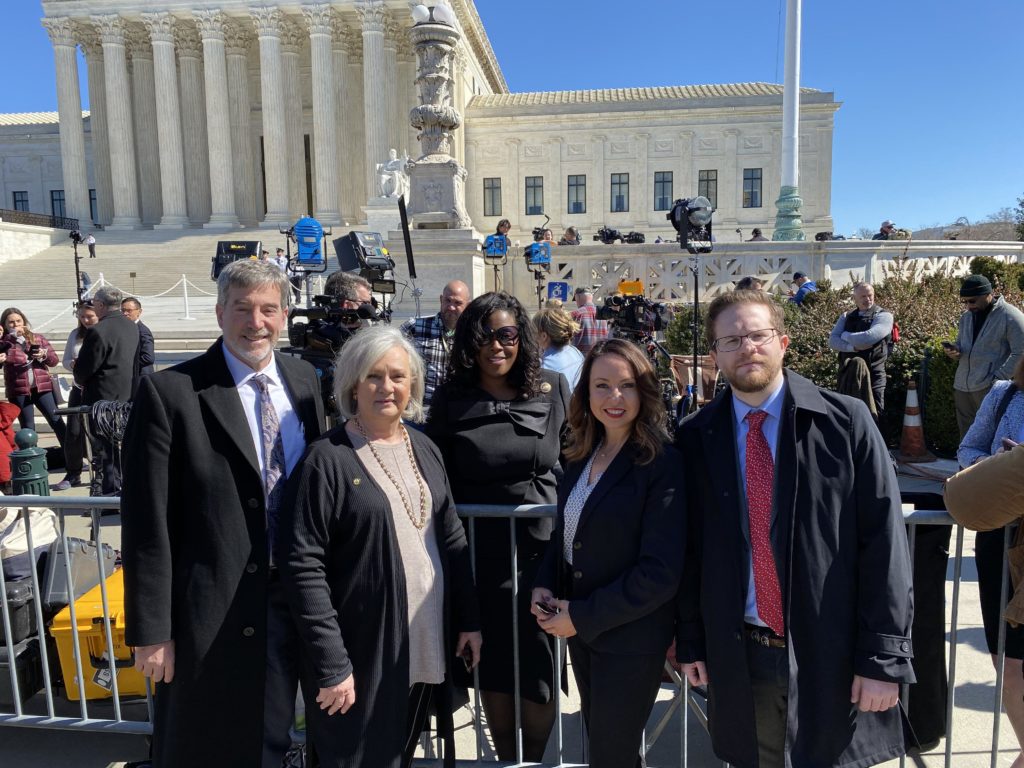The Supreme Court spoke out on the abortion issue once again, and again we are disappointed with the justices’ decision.
The Supreme Court’s 5-4 ruling in June Medical Services v. Russo renders the reasonable Louisiana law requiring doctors who perform abortions to have hospital admitting privileges unenforceable. Abortion providers can also continue to challenge states’ abortion facilities safety regulations in federal court — regulations that clearly benefit the women they claim to represent — without an actual patient among the plaintiffs.

The takeaway from this ruling is not lost on us. The court does not have enough conservative votes at this time. Consequently, the Supreme Court’s unjust Roe v. Wade precedent stands for the foreseeable future.
The Supreme Court needs more justices who are willing to take a fresh look at Roe, like those appointed by President Donald Trump. Our organization’s top priority is to urge voters to re-elect President Trump. This is the best and only path to restore protection from abortion to mothers and their unborn children.
The various segments of the pro-life movement agree that society — through our laws — must protect innocent unborn children throughout pregnancy. And we all agree that society should continue to provide compassionate alternatives to abortion, including adoption.
To that end, in 2003, the Texas Legislature passed the Prenatal Protection Act that protects unborn children from violent acts against the wishes of the mother including assault and homicide. Local state Rep. Tom Craddick supported that landmark law that protects an unborn child cradled in her mother’s womb from murder in the same way it protects a newborn child cradled in her mother’s arms. Some are now serving life sentences for murdering an unborn baby, even when the mother survived the attack.
Protecting an unborn child from an abortion to which the mother consents is currently more elusive, at least in regard to abortion on a child who is not “viable” and cannot survive outside the womb. States may ban abortion on viable babies, and Texas has done so with its 20-week ban enacted in 2013.
However, Roe’s terribly unjust precedent strictly prohibits pre-viability abortion bans and laws that substantially limit abortion access. Every state law attempting to ban abortions on non-viable babies, such as heartbeat bans, dismemberment bans, bans on abortions of babies with Down syndrome, and even safety regulations that risk closing abortion facilities, have failed. None have withstood federal court challenges. Furthermore, courts have forced those states to reimburse the abortion industry’s attorney’s fees, costing taxpayers millions of dollars. Rather than protecting innocent unborn lives, these pre-viability bans have effectively become a meal ticket for the abortion industry.
Rather than protecting innocent unborn lives, these pre-viability bans have effectively become a meal ticket for the abortion industry.
While some organizations take the approach of trying to move legislation forward that ignores the Supreme Court, ignoring any court in our country, is just not possible. We are a nation of laws based on the Constitution, which the judiciary has the responsibility of interpreting. Texas can no sooner ignore the Supreme Court on abortion today than other states could ignore the federal court-mandated dismantling of racial segregation laws in the last century.
The question for the Texas Legislature is this: what should we learn from June Medical Services? Should we continue advocating for immediate pre-viability abortion bans, knowing the federal courts will prevent enforcement and force taxpayers to pay huge attorneys’ fees to abortion industry plaintiffs? Do we need more predictable failures with severe costs?
Or should we enact a longer-term strategy and focus our efforts on passing an abortion ban that goes into effect when the Supreme Court has more justices willing to take a fresh look at Roe v. Wade? Ten states have taken this more strategic approach by passing what is called a “trigger ban” on abortion. This law provides complete protection from abortion, beginning at fertilization, when and to the extent Roe is overturned. There is no way this law can be challenged in court, and it will go into effect as soon as possible. The legislature considered the “trigger ban” last year. Unfortunately, it did not pass either chamber. That is not uncommon for a new concept in its first session. We ask the Legislature to seriously consider this approach when it convenes in January and deliver the bill to pro-life Gov. Greg Abbott’s desk for his signature.
In the meantime, we must re-elect President Donald Trump, who gives the best and only realistic chance at appointing new justices who will allow a trigger ban — and protections for unborn children — to go into effect.
Joe Pojman is the executive director of Texas Alliance for Life. As published in Midland Reporter Telegram on Sunday, July 19, 2020.

One Response to “Pro-life Movement Can Learn from the Supreme Court”
John E. Taylor
That was the strategy 35 years ago when I was with right to life in Maine – work to overturn Roe v Wade.
The Constitution never intended for abortion to be regulated at the federal level, but at the state level. Roe is a blatantly unconstitutional power grab. The sooner Texas figures that out, the better.
My website above is a primer on how it can be done.